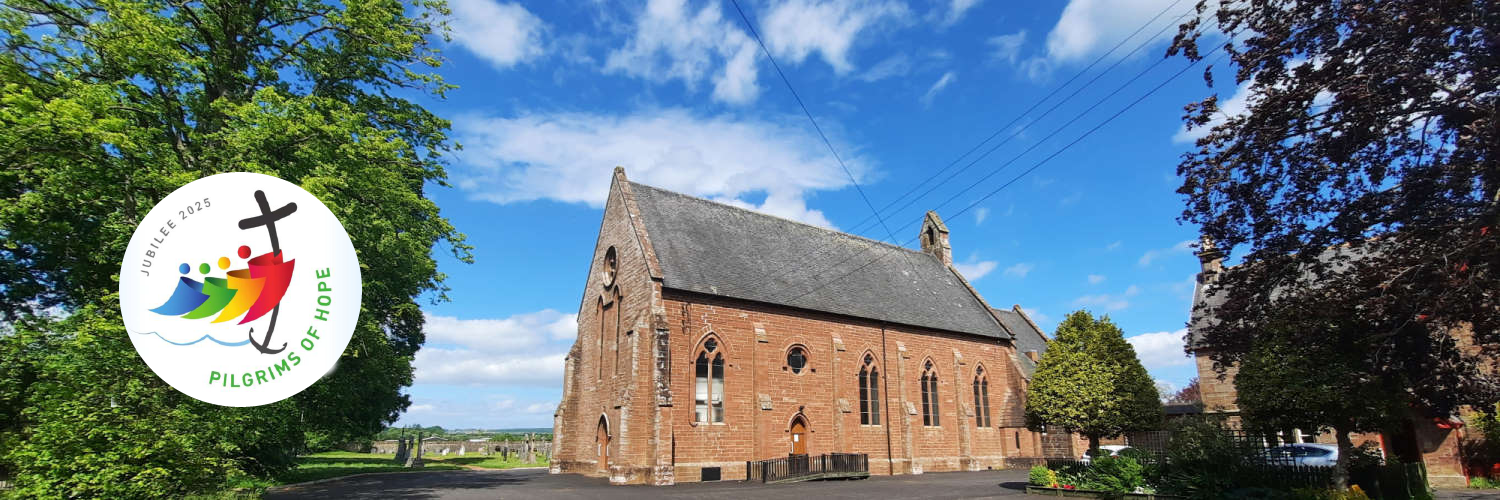TODAY
St. Mary’s Beauly is a Jubilee 2025 Pilgrimage Site
We are one of three designated pilgrimage sites in the Highlands for the year of Jubilee 2025, the others being Pluscarden Abbey and St. Mary’s Cathedral, Aberdeen. During this year of Jubilee, make a pilgrimage to any one of these three designated pilgrimage sites to gain a plenary indulgence.
See our dedicated Jubilee Page
Reflection on the readings for the 7th Sunday of Easter (Year C) – click to view
My dear brothers and sisters in Christ,
As we approach the culmination of the Easter season, the readings weave together the themes of witness, hope and unity. Stephen’s martyrdom in Acts, the royal acclamation of God in the Psalm, the final invitation of Revelation and Jesus’ high-priestly prayer in John all lead us into the heart of what it means to live as Easter people.
Saint Luke (Acts 7:55–60) presents Stephen as the first Christian martyr. Filled with the Holy Spirit, he looks up to heaven and sees “the glory of God and the Son of Man standing at God’s right hand.” Even under a rain of stones, Stephen forgives his persecutors: “Lord, do not hold this sin against them.” Stephen’s speech prior to his death critiques the Jewish authorities for resisting the Spirit, just as their ancestors resisted Moses and the prophets. His vision of the exalted Christ reveals that God’s kingdom breaks into history precisely through suffering and forgiveness. In our society, Christians may rarely face stones, but we do encounter hostility, mocking comments, professional setbacks, or subtle pressure to compromise our beliefs. Like Stephen, we must stand firm in the Spirit, forgiving those who oppose us and trusting that Christ stands with us. Our willingness to forgive, whether in family disputes, workplace injustices, or online debates, becomes a powerful witness to the risen Lord.
In his final vision (Revelation 22:12–14, 16–17, 20), St John hears the triumphant cry: “Behold, I am coming soon.” Blessed are those who heed the invitation, who “wash their robes” in the Lamb’s blood. And the Spirit, together with the Bride – the Church – echoes the call: “Come.” Revelation was written to persecuted communities struggling under imperial oppression. Its message: the coming of Christ inaugurates the new creation. The imagery of a wedding feast invites all to share in that eternal joy. Our society often treats salvation as a private matter or postpones it indefinitely. But Revelation reminds us of urgency; Christ’s coming calls for readiness. Let us invite friends and neighbours to our parish, be intentional in extending personal invitations to Mass and live lives that reflect the joy of the wedding feast, so that others may hear the Spirit’s summons.
In the final portion of the Gospel (John 17:20–26), Jesus prays not only for His first disciples but for all who will believe through their word. His longing is clear: “That they may all be one… so that the world may believe.” Jesus prays in the context of imminent betrayal and abandonment, yet His concern is not for Himself but for the community’s unity. He reveals that the Church’s mission hinges on visible communion, mirroring the unity of the Father and Son. In a society fractured by political, social and even theological divisions, our unity as Christians speaks louder than any argument. Ecumenical endeavours, joint services with fellow Christians, shared social outreach, and prayer vigils for peace are not optional extras but central to our witness. Within our parishes, let us forge one heart and mind in Christ.
We can challenge ourselves by:
Cultivate Forgiveness: Follow Stephen’s example by practising forgiveness in parish life, reconciling differences in committees, seeking peace with those we find difficult and forgiving past hurts.
Proclaim the Invitation: Use various media, social, newsletter and personal encounters to extend the Spirit’s call: “Come.” Also, welcome new people.
Build Visible Unity: Collaborate with neighbouring parishes, other Christian communities and civic groups on projects of charity, environmental stewardship and support for the most vulnerable.
My beloved parishioners and friends, the Ascended Lord stands at the Father’s right hand, interceding for us. The Spirit invites us to prepare the way for His return by living lives marked by courage, joy, readiness and unity. May our parishes become seeds of God’s new creation and may we, with Stephen and all the martyrs, saints and angels, one day share in the fullness of that heavenly wedding banquet. “As you sent me into the world, so I have sent them.” Let us go forth in peace, loving one another as Christ has loved us. Amen.















